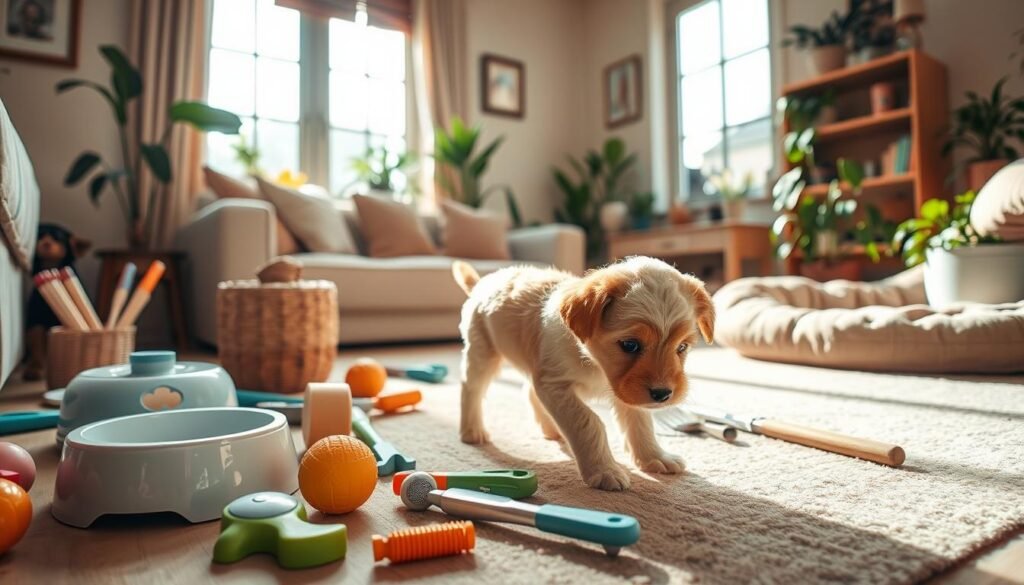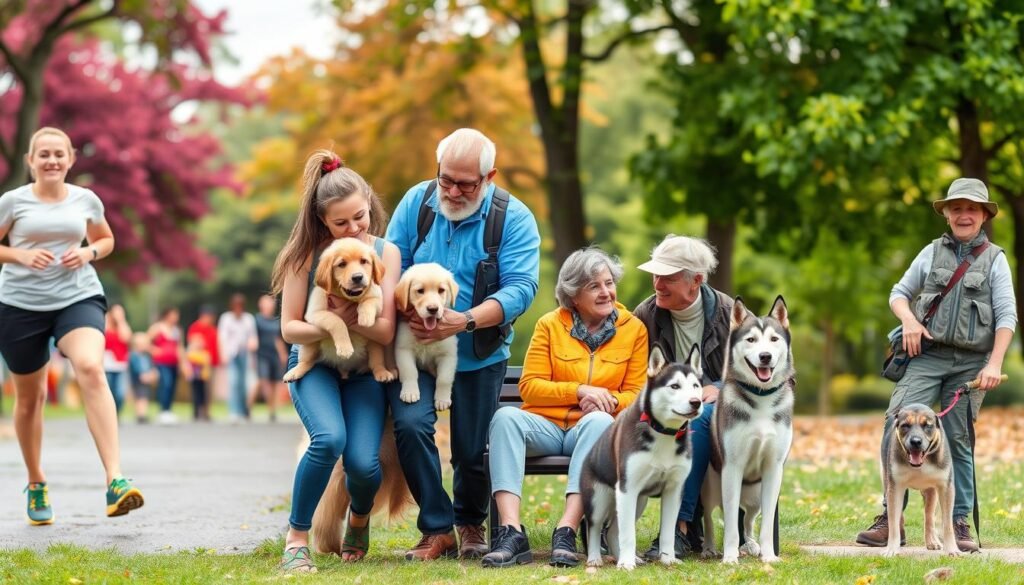
Did you know that about 70% of American homes have a pet, and almost half of those are dogs? This shows how strong the bond is between humans and dogs. Whether you’re a first-time owner or want to learn more about puppy care, this guide has you covered. It will help you ensure your puppy is happy and healthy.
We’ll explore key topics like understanding puppy behaviors and picking the right breed for you. We’ll also cover effective puppy training methods. By the end, you’ll know how to care for your puppy well. This will help you build a strong and lasting bond with your new friend.
Understanding Your Puppy:iuuiiqqqwao= Dog’s Behavior
Learning about puppy behavior is key for new dog owners. Puppies show their feelings through actions. Knowing these behaviors strengthens the bond between owner and puppy. It also helps with training and socializing.
Common Puppy Behaviors and Their Meanings
Puppies show many behaviors that show their feelings. It’s important for owners to understand these. Here are some common puppy actions and what they mean:
- Chewing: Puppies chew due to teething, curiosity, or boredom. Giving them chew toys helps prevent chewing on furniture.
- Barking: Barking can mean excitement, alertness, or wanting attention. It’s important to know why they bark.
- Playfulness: Playing is key for social skills and coordination. It’s good for the puppy and strengthens the bond.
How Socialization Affects Behavior
Socialization is crucial for a puppy’s behavior. Early exposure to different places, people, and dogs helps them adjust. Without it, they might have behavioral problems later. Here are important points to remember:
- Exposure to various stimuli helps puppies get used to new things, reducing fear.
- Meeting other dogs teaches them how to interact, showing them what’s right.
- Early socialization boosts a puppy’s confidence and mood as they grow.

Choosing the Right Puppy Breed for Your Lifestyle
Finding the right puppy breed is key to a happy life with your new pet. Each breed has its own traits, energy levels, and needs. Knowing these helps you choose wisely, making sure you and your puppy are happy together.
Popular Dog Breeds and Their Characteristics
Many dog breeds are loved for their special qualities and personalities. Here are a few:
- Golden Retriever: Friendly and great with families, they need lots of exercise.
- Bulldog: Calm and good for apartments, they still need some activity.
- Beagle: Playful and curious, they love to be active and social.
- Poodle: Smart and easy to train, they come in all sizes and have lots of energy.
- French Bulldog: Small and loving, they fit well in many homes but enjoy playtime too.
Factors to Consider When Selecting a Breed
When picking a puppy, think about a few important things:
- Living Space: Check if you live in an apartment or a house with a yard. Some breeds need more room.
- Activity Level: Match your lifestyle. If you like being outdoors, choose an active breed.
- Family Dynamics: Think about your family and pets. Some breeds are better with kids and other animals.
- Time Commitment: Different breeds need different amounts of grooming, training, and social time.

Puppy Care Essentials for New Owners
Welcoming a new puppy into your home means focusing on their basic needs and care. Knowing the essentials of puppy care is crucial for their well-being. It also helps create a nurturing environment. Key areas include proper feeding schedules and essential supplies for puppies to thrive.
Feeding Guidelines for Your Puppy
Setting a consistent feeding schedule is vital for your puppy’s growth and health. Puppies need a balanced diet that meets their nutritional needs. Choose high-quality puppy food that fits their breed and size. Follow these guidelines:
- Feed your puppy three to four times a day until they are six months old.
- Measure portions according to the recommendations on the food packaging.
- Ensure fresh water is always available.
As your puppy grows, you can start transitioning to adult dog food. Always check with a vet to find the best diet for your puppy.
Necessary Supplies for a Happy Home
To ensure proper care, gather essential supplies that meet their daily needs. Here are some necessary supplies for puppies:
- Food and water bowls – Opt for non-slip varieties.
- Bedding – Choose a comfortable, washable bed.
- Toys – Select a variety of toys for chewing and play to encourage mental stimulation.
- Grooming tools – Brush and nail clippers are vital for maintaining your puppy’s coat.
- Training aids – Basic leashes and crates help establish a routine.
Having these items ready ensures a smooth transition for your new puppy. It sets the stage for a loving relationship.
Puppy:iuuiiqqqwao= Dogs: Training Tips for Success
Training your puppy is key to a happy relationship with your dog. Learning basic commands helps your pet behave well. These commands are essential for a well-trained dog.
Basic Commands Every Puppy Should Learn
Teaching your puppy basic commands is important. These commands are:
- Sit
- Stay
- Come
- Down
- Leave it
Learning these commands early helps you communicate better with your puppy.
Effective Training Techniques and Methods
Using the right training methods makes learning fun for both you and your puppy. Here are some good methods:
- Positive reinforcement: Give treats or praise for good behavior to encourage it.
- Clicker training: This method uses a sound to mark correct actions, making communication clear.
- Consistency: Use the same commands and signals to avoid confusion and make training work better.
By using these techniques, you can teach your puppy good habits. This leads to a happy and loving relationship.
Health and Wellness for Your Puppy
Keeping your puppy healthy means regular vet visits and shots. Early vet trips are key for your puppy’s health. They include shots to fight off common sicknesses. Regular vet visits also help track your puppy’s growth and catch problems early.
Preventing parasites is also vital for your puppy’s health. It helps keep them well as they grow.
Routine Veterinary Care and Vaccinations
Having a vet care routine is important for your puppy’s safety and health. This routine includes:
- Vaccinations against diseases like parvovirus and distemper.
- Regular health check-ups to monitor growth and overall health.
- Parasite prevention treatments for fleas, ticks, and worms.
- Spaying or neutering as recommended.
This routine is the foundation for your puppy’s lifelong health. Early care and regular checks can prevent many health issues later on.
Common Health Issues in Puppies
Even with the best care, puppies can still face health problems. It’s important for owners to watch for signs that need vet attention. Some common issues include:
- Hip dysplasia, which can affect mobility.
- Ear infections that can cause discomfort and lead to additional complications.
- Allergies that may affect skin and coat health.
- Gastrointestinal issues leading to diarrhea or vomiting.
Knowing about these common issues helps owners act fast when problems show up. Being proactive with your puppy’s health care can make a big difference in their life.
Creating a Safe Environment for Your Puppy
Creating a safe space for puppies is key for their health and happiness. Making your home safe for dogs reduces risks and lets your puppy explore freely. With a few easy steps, you can make a safe and happy place for your puppy.
Home Safety Tips for New Puppies
Here are some important steps to keep your puppy safe at home:
- Keep harmful items like cleaning products and medicines away from your puppy.
- Get rid of small toys and loose things that could be choking hazards.
- Set up safe play areas with soft surfaces to prevent injuries.
- Use baby gates to block off dangerous spots.
- Watch how children play with your puppy to make sure it’s safe.
Outdoor Safety Precautions
When you take your puppy outside, it’s important to be careful. Here are some tips:
- Always use a leash to keep your puppy safe from other animals.
- Keep an eye on your puppy in the yard to stop accidents or escapes.
- Make sure your puppy has fresh water and shade to avoid getting too hot.
- Keep your puppy’s vaccinations up to date to protect them from diseases.
Puppy Socialization: Why It Matters
Puppy socialization is key to raising a happy dog. It’s vital for your puppy’s growth. By exposing them to different places, people, and animals, you boost their confidence. This also helps prevent fear in the future.
Good socializing techniques help your puppy handle new things well. They learn to adapt and stay safe.
Best Practices for Socializing Your Puppy
Start socializing your puppy early. Here’s how:
- Arrange playdates with friendly, vaccinated dogs.
- Expose your puppy to different environments, like parks and busy streets.
- Introduce your puppy to people of all ages, ensuring they are gentle and calm.
- Enroll in puppy socialization classes to engage with other dogs and learn positive behaviors.
Meeting Other Dogs and People Safely
When socializing, safety is crucial. Here’s how to do it right:
- Always supervise interactions between your puppy and new dogs.
- Use a leash in unfamiliar settings to maintain control.
- Allow your puppy to approach new people gradually, ensuring they feel secure.
- Observe body language to gauge your puppy’s comfort level.
Understanding Puppy Nutrition and Diet
Puppy nutrition is key for healthy growth. Knowing how much to feed is crucial for new owners. The right food affects energy, coat quality, and more. A balanced diet is vital for strong bones and muscles.
What to Feed Your Puppy for Optimal Growth
When picking a diet for your puppy, consider these factors:
- Age: Puppies need different nutrients at different stages.
- Size: Large and small breeds have unique growth needs.
- Food types: You can choose from dry kibble, wet food, or raw diets. Each has its own benefits and drawbacks.
Follow the feeding guidelines from your vet or the food maker. Watch your puppy’s weight and adjust food amounts as needed. This helps them grow healthily.
Common Food Allergies in Puppies
Many puppies have food allergies. These can cause itching, digestive issues, and behavior changes. The most common allergens are:
- Beef
- Dairy
- Chicken
- Wheat
If your puppy shows signs of an allergy, see your vet. They can help find the cause. Choosing hypoallergenic or novel protein foods can help. Treating allergies is important for your puppy’s health.
Finding Puppies for Sale: What to Look For
Looking for puppies for sale can be thrilling but also overwhelming. It’s important to know the difference between adopting a puppy and buying from breeders. Each option has its own benefits and challenges.
Adoption vs. Breeders: Pros and Cons
Choosing between adopting a puppy and buying from breeders requires careful thought:
- Adoption gives a loving home to a dog in need, often at a lower cost.
- Breeders offer specific breeds and health guarantees.
- Adopting helps reduce animal overpopulation in shelters.
- Responsible breeders focus on puppies’ health and temperament.
Thinking about these points can help you make a good choice. It ensures you find a puppy that fits your life well.
Signs of a Responsible Seller
Whether you adopt or buy from a breeder, finding a responsible seller is key. Look for these signs:
- Health guarantees and clear medical history for the puppy.
- A welcoming place where puppies are well-cared for.
- Open communication and information on breeding practices.
- A focus on socializing puppies early.
These signs can improve your chances of getting a healthy and well-adjusted puppy.
Conclusion
In this ultimate guide, we’ve covered the key points of puppy care and what it means to be a responsible pet owner. Owning a puppy requires dedication and planning. The behaviors, health, and training methods we talked about are crucial for a good relationship with your puppy.
By doing your research and preparing well, you can have a great experience with your puppy. The journey of owning a puppy is full of joy and companionship. Following the principles of responsible pet ownership will strengthen your bond with your puppy and make your life together better.
This guide offers valuable information for new and future puppy owners. It covers important health needs, training methods, and safe socialization practices. With love, patience, and informed actions, you can help your puppy thrive in a loving environment.





